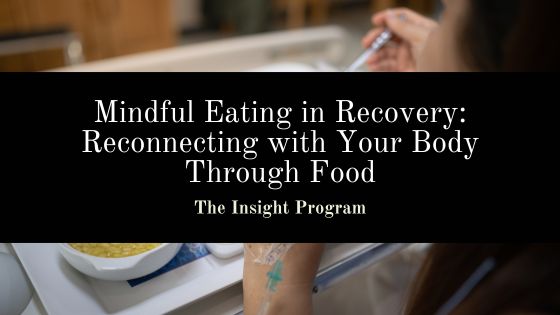Recovery is not only about staying sober. It is about rebuilding a healthy and balanced relationship with your body, mind, and emotions. One often overlooked part of this healing process is how we relate to food. Mindful eating can play a powerful role in recovery by helping individuals reconnect with their bodies, develop awareness of their physical and emotional needs, and rebuild a positive relationship with nourishment.
The Impact of Addiction on Eating Habits
Addiction often disrupts basic self care, including eating. During active substance use, regular meals may be skipped, nutrition may be ignored, and the body’s hunger cues can be dulled or misinterpreted. Substances may have been used to numb emotional pain or replace meals altogether. As a result, people in recovery may experience unhealthy cravings, irregular eating patterns, and a distorted relationship with food.
Mindful eating offers a way to restore this essential connection and bring attention to what the body truly needs.
What Is Mindful Eating?
Mindful eating is the practice of paying full attention to the experience of eating. It involves being present in the moment, noticing the colors, textures, smells, and tastes of your food, and tuning in to hunger and fullness cues without judgment. It also means observing the thoughts and emotions that come up around food without reacting impulsively.
Unlike dieting or restrictive eating, mindful eating is not about controlling food. It is about listening to your body with curiosity and compassion. This awareness helps break the cycle of emotional or compulsive eating that can develop during or after addiction.
Healing Through Awareness
In recovery, mindful eating helps individuals become more aware of their bodies and rebuild trust in their internal signals. When you pause to check in before and during meals, you can begin to notice whether you are truly hungry or trying to soothe an emotional need.
This practice also helps with identifying triggers that may lead to overeating, skipping meals, or making choices that do not support recovery. Over time, you begin to make food choices that nourish not only your body but also your emotional well being.
Establishing Routine and Structure
Incorporating mindful eating into your daily routine creates a healthy rhythm. Structured meals at regular times support physical stability and reduce stress. Sitting down to eat without distraction, chewing slowly, and focusing on your food can become small acts of self care that reinforce your commitment to recovery.
These habits also help reestablish a sense of control and predictability, which can be deeply comforting during periods of emotional uncertainty.
Food as a Tool for Connection
Mindful eating also creates space for gratitude and connection. Preparing meals with intention, sharing food with others, or simply appreciating the nourishment on your plate can become grounding and joyful experiences. Food can once again become a source of comfort in a healthy, supportive way.
Conclusion
Mindful eating is a powerful tool for those in addiction recovery. By bringing awareness, kindness, and structure to your relationship with food, you reconnect with your body, build emotional resilience, and strengthen your overall sense of well being.
Recovery is about healing the whole self, and that healing often begins with something as simple as the next bite.

